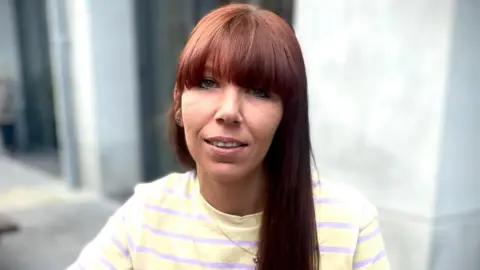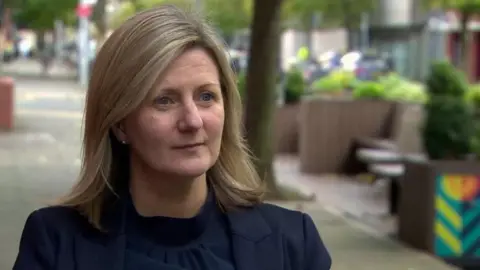'I slept with a hammer at my bed for protection - now I have peace of mind'
 BBC
BBCA domestic violence victim who said she slept with a hammer beside her bed for protection has described a scheme that installed new cameras, locks and security lights at her home as a lifeline.
Ashleigh Murray, 34, said she was terrified her abusive ex-partner would attack her and her unborn child at home.
But she said the Housing Executive's Sanctuary Scheme helped her rebuild her life.
The scheme allows people to stay in their homes with additional security measures, including cameras, lights, door and window locks and safety rooms.
Warning: This story contains details some may find distressing
The mother-of-one's ex-partner Donald Newell was sentenced in November 2023 to two years' probation after he was convicted of common assault, criminal damage and persistent improper use of electronic communications to cause anxiety against her.
Newell, 35 from Saltcoats outside Glasgow, was also convicted of being in breach of a non-molestation order against Ms Murray and sentenced to three months in jail, suspended for two years.
"Donald was very scary," said Ms Murray.
"He preyed on the good in you, seeing the good in him.
"Whenever he'd come out of that rage, he would always have a rhyme and reason as to why he was doing it.
"I was always the problem. It was always my fault."
She described a litany of abuse directed at her by her former partner including being strangled, verbally abused in public and threatened.
"I didn't deserve for him to threaten my life. I didn't deserve any of that," she said.
Newell would "always promise he would get help", she added, but the abuse got worse.
She recalled a night when getting into the car with her former partner, who was drunk.
"He was pushing my face into the car window. Telling me he was going to cave my head in. He was going to punch me.
"He then broke the ligaments and tendons in my fingers."
On another occasion, Newell drove a car into one being driven by Ms Murray, who was five months pregnant.
"He followed me down the dual carriageway and rammed me.
"I was pregnant and had reduced movement and had to go to hospital."
What does the Sanctuary Scheme do?
But she said the help received through the Housing Executive's Sanctuary Scheme gave her "real peace of mind".
Living in a one-bedroom flat and pregnant, Ms Murray said her house was red-flagged due to the risk Newell posed to her and her unborn daughter.
"He was given a non-molestation order to stay away within a mile of my property. But that didn't stop him," she said.
As part of the scheme, the Housing Executive installed door and window alarms, flood lights, cameras and heavy-duty door locks.
"If anyone tries the door, the alarms go off; if anyone taps my window, the alarms go off," she said.
"I rely on the alarms. I can watch my home from my cameras when I'm out also.
"It just gives me that peace of mind."
She added: "The thought of him knowing where I was whenever he leaves jail or after the non-molestation order ran out was actually a very scary thing. I was always on edge.
"So the fact that I can surround myself with good neighbours that are able to keep an eye out for me is a big relief.
"My daughter can grow up in peace and safety away from him."
 Getty Images
Getty ImagesHow does social housing work for domestic abuse victims?
Kerry Logan, from Housing Rights, welcomed the scheme but said she would like to see it extended beyond Housing Executive homes.
She also said an underlying issue was the urgent need for the government to build more social homes.
"With more than 49,000 households on the social housing waiting list in Northern Ireland and a temporary accommodation crisis, it can be very challenging for people fleeing domestic violence abuse to find a safe place to live in the time frame that they need it," she added.
Ms Logan also called for people experiencing domestic abuse to be prioritised on the social housing waiting list, by giving them access to a "much higher level of points than they're currently able to".

'Scale of violence'
Previously, victims of domestic violence were awarded fewer points for social housing than victims of terrorism or paramilitary intimidation.
However, that changed in May when intimidation points were removed from social housing applications.
Communities Minister Gordon Lyons said it was to "level the playing field for victims of violence".
Figures from October 2023 to March 2024 show that 607 people presented as homeless due to the treat of domestic violence compared to 101 for intimidation.
Grainia Long, chief executive of the Housing Executive, said balancing the system is "a long-term project".
She said the removal of intimidation points was recommended to the department by the Housing Executive and that it is now putting in place a system that "ensures that the points that are allocated better reflect the nature of the violence and the scale of the violence".
She added: "I think the public understand the profound effect that domestic violence has on women.
"It's really important we talk about these things and build public awareness."
If you are affected by any of the issues raised, help and support is available via BBC Action Line.
